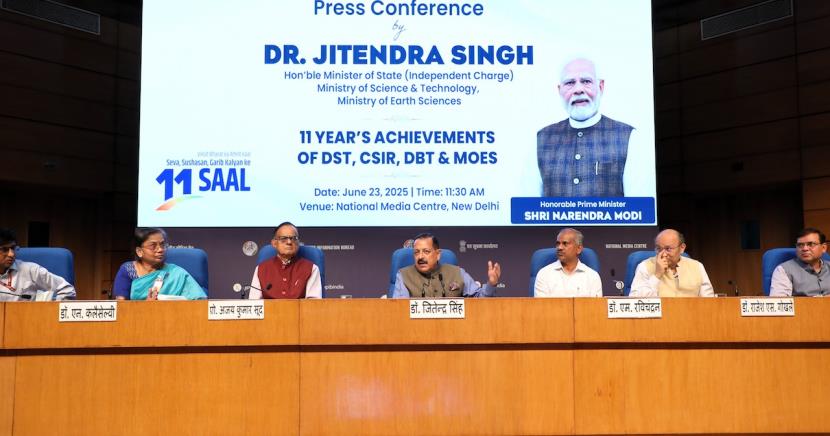Last 11 years turned technology into engine of India growth story: Dr Jitendra

Jun 23, 2025
NEW DELHI: Dr. Jitendra Singh, Union Minister of State (Independent Charge) for Science & Technology, Earth Sciences, and MoS in the Prime Minister Office, Dept. of Space and Atomic Energy today declared that the last 11 years had turned technology into engine of India growth story and thus a significant contributor to the national economy, owing to the transformative science-led governance and technology driven reforms introduced by Prime Minister Narendra Modi in every sector.
Addressing a joint press conference of all Science Ministries, including the Ministry of Earth Sciences, held at the National Media Centre, Dr. Jitendra Singh said,
"In the changed scenario over the last one decade , India is not just participating but is shaping global scientific discourse. We are setting benchmarks for others to follow."
Dr. Jitendra Singh underscored how India has moved from the sidelines to the centre stage of the global scientific ecosystem, thanks to pioneering reforms, citizen-centric innovation, and out-of-the-box decisions-such as the unlocking of space and nuclear sectors-initiated under PM Modi.
"The multiplier impact of these reforms is being seen across sectors-agriculture, education, disaster management, defence, governance, and even climate resilience," the Minister said.
The Minister hailed India as the emerging global biotech destination, propelled by the BioE3 Policy-Biotechnology for Economy, Environment, and Employment.
"India today offers the most enabling environment for biotechnology. The time is right, the ecosystem is ripe, and we have visionary leadership steering us toward becoming a global bioeconomy leader," he said.
Dr. Jitendra Singh credited Prime Minister Narendra Modi for his visionary leadership, unwavering commitment to science and technology, and for creating an enabling environment that empowers India's scientific community. He emphasized that under the Prime Minister's patronage, scientists today enjoy unprecedented freedom, trust, and institutional support to innovate, explore, and contribute meaningfully to national development.
Dr. Jitendra Singh added that it is this liberty and encouragement extended to the scientific fraternity that has catalyzed breakthroughs across sectors-from biotech and space to climate science and agri-tech. "Such trust in science from the highest level of leadership is rare, and it has transformed India into a global hub for innovation and technology," he noted.
He highlighted several groundbreaking innovations under the Department of Biotechnology (DBT), including India's first indigenously developed DNA-based COVID vaccine, which marked a historic milestone in the country's pandemic response. He also noted the successful clinical trials for haemophilia therapy, showcasing India's growing capabilities in advanced biomedical research. Another notable achievement was the development of Kisan BiokkAvch, an innovative anti-insecticide suit designed to protect farmers from harmful chemical exposure, reflecting the government's commitment to ensuring both safety and dignity for India's agricultural workforce.
Dr. Jitendra Singh highlighted that India-developed biotech kits will be used by astronaut Shubhanshu Shukla for conducting experiments onboard the upcoming Axiom 4 Mission, marking another leap for Indian science into space biology.
Praising the Council of Scientific & Industrial Research (CSIR), Dr. Jitendra Singh noted its leading role in nurturing agri-based startups, including the Purple Revolution and widespread lavender cultivation in the Himalayan region, transforming lives through aroma-based entrepreneurship.
Dr. Jitendra Singh credited the Ministry of Earth Sciences for extending the Neighbourhood First policy by sharing climate and disaster forecasts with India's neighbours through dedicated satellite infrastructure.
He also announced that the Samudrayaan mission is on track and Matsya 6000, India's deep-sea exploration vehicle, is currently undergoing final safety checks. Sea trials are expected to begin in 2025.
Under the Department of Science and Technology (DST), Dr. Jitendra Singh showcased how cutting-edge technologies are being leveraged to transform rural empowerment and governance. He highlighted the use of drone and satellite mapping for the Soil Health Card and Swamitva Mission, which has empowered farmers by providing precise agricultural data and minimized their dependency on revenue officials. Additionally, he pointed to the application of geo-mapping for disaster management and land record modernization, leading to the creation of digitally verified property rights and more efficient land administration. "Our farmer is now a master of his own destiny, thanks to science," Dr. Singh remarked, underlining the transformative role of technology in rural India.
The Minister emphasized that today, India is not borrowing best practices but beckoning others-guiding nations with scalable, frugal, and people-first science solutions.
Principal Scientific Advisor Prof. Ajay Kumar Sood said, "Science has truly come to the centre stage in India's development journey."
Dr. Abhay Karandikar, Secretary DST, presented a comprehensive review of the scientific advances made in the last decade, applauding the synergy between research institutions and startups that has turned ideation into economic success stories.
Secretary Dr. M. Ravichandran shared that forecast accuracy, radar deployment, and real-time disaster early warnings have significantly improved, especially across the Delhi-NCR region.
CSIR DG Dr. N. Kalaiselvi shared innovations across CSIR's 37 labs that are driving industry-grade impact across India.
Dr. Rajesh Gokhale, Secretary of DBT, referred to the development of seven vaccines, the filing of over 1,750 patents, the sequencing of more than 3 lakh COVID genomes, and the rise of the biotech economy to $165.7 billion.